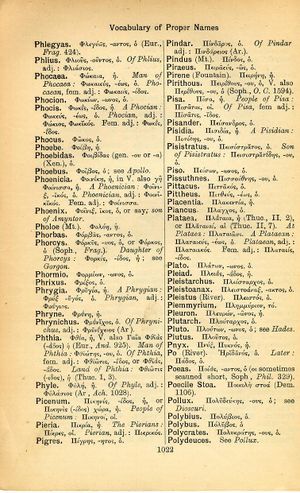Pisa
Ὅμοια πόρνη δάκρυα καὶ ῥήτωρ ἔχει → Lacrumae oratori eaedem ac meretrici cadunt → Von Dirne und von Redner sind die Tränen gleich
English > Greek (Woodhouse)
Πῖσα, ἡ.
People of Pisa: Πισᾶται, οἱ.
Of Pisa, fem. adj.: Πισᾶτις, -ιδος.
Latin > English (Lewis & Short)
Pīsa: ae, and, less freq., Pīsae, ārum, f., = Πῖσα,
I a city of Elis, on the Alphēus, near which the Olympic games were celebrated: aut Alphea rotis praelabi flumina Pisae, Verg. G. 3, 180: Pisa, Ov. Ib. 327; Stat. Th. 4, 238: Pisae Oenomai, Mel. 2, 3, 4.—Hence, Pīsaeus, a, um, adj., of or belonging to Pisa, Pisœan: Arethusa, so called because, acc. to the myth, it rose in Elis, Ov. M. 5, 409: hasta, of Oenomăus, king of Elis, id. Am. 3, 2, 15: Pisaeā lege trementem currere et Oenomai fremitus audire sequentis, i. e. the law by which any one who demanded Hippodamia in marriage, was compelled to contend in the chariot-race with her father Oenomaus, and, if defeated, was put to death, Stat. S. 1, 2, 41: Pisaeique tori legem, Nemes. Cyn. 23: Pisaeae ramus olivae, Juv. 13, 99: praemia, prizes, Att. ap. Prisc. p. 698 P.: annus, in which the Olympic games took place, Stat. S. 1, 3, 8; id. Th. 1, 421: ebur Pisaeo pollice rasum, by the hand which wrought the Olympic Jove, i. e. that of Phidias, id. S. 4, 6, 29.—
B Subst.: Pīsaea, ae, f., Hippodamia, Ov. Tr. 2, 386.

